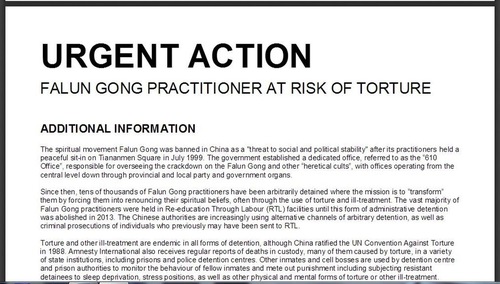(Minghui.org) Amnesty International (AI) published an Urgent Action (UA: 140/16 Index: ASA 17/4275/2016) on its website on June 17, 2016 to rescue Qin Wei, a Falun Gong practitioner who was taken into police custody in Beijing on May 18, 2016.
Qin Wei, was arrested for distributing commentary criticizing the Chinese Communist Party. He is at risk of torture and other ill-treatment.
 Screenshot of Urgent Action request from Amnesty International website
Screenshot of Urgent Action request from Amnesty International website
AI's notice said that Qin Wei was taken away by plainclothes police in Haidian District Beijing on May 18 after he distributed a copy of The Nine Commentaries on the Communist Party.He was later criminally detained on suspicion of “using an evil cult to undermine law enforcement.”
It is the eighth time Qin Wei has been detained because of his belief. The longest time he was previously detained was a five and a half year imprisonment in 2004. He was placed under solitary confinement, and subjected to “brainwashing” and forced labor. In his other previous detentions, he was tortured with electric batons to his face and was subjected to long periods of sleep deprivation, once according to sources for up to five months during the period of October 2003 – May 2004. After this he developed an irregular heartbeat leading to a cardiac arrest. He is currently at serious risk of torture and other ill-treatment.
His lawyer has written to Haidian District Public Security Bureau and Haidian District Procuratorate to demand the authorities drop the charge against Qin Wei and release him from criminal detention citing the fact that freedom of religion and belief and freedom of expression are enshrined in the Chinese Constitution, and that no state agency has ever officially declared that Falun Gong is an evil cult.
The notice appeal to the public to help Falun Gong practitioner Qin Wei from being tortured by writing to related entities include: Chinese Minister of Public Security, Premier Li Keqiang, Director of Haidian District Detention Center and Chinese Ambassador in the UK.
AI wanted people to request the following 3 points:
• Demanding that the authorities immediately and unconditionally release Qin Wei, as he has been detained solely for exercising his right to freedom of belief and expression;• Urging them to ensure that while detained, Qin Wei is protected from torture and other ill-treatment, and that the conditions of his detention adhere to international law and standards.• Calling on the authorities to ensure Qin Wei have regular access to his family and lawyers.
AI’s notice also included a brief introduction of Falun Gong and the Communist regime's persecution of the spiritual group.
 This Amnesty International website screenshot shows a brief introduction of Falun Gong and the persecution of the spiritual group in China.
This Amnesty International website screenshot shows a brief introduction of Falun Gong and the persecution of the spiritual group in China.
The spiritual movement Falun Gong was banned in China as a "threat to social and political stability" after its practitioners held a peaceful sit-in on Tiananmen Square in July 1999. The government established a dedicated office, referred to as the “610 Office”, responsible for overseeing the crackdown on the Falun Gong and other “heretical cults”, with offices operating from the central level down through provincial and local party and government organs.
Since then, tens of thousands of Falun Gong practitioners have been arbitrarily detained where the mission is to “transform” them by forcing them into renouncing their spiritual beliefs, often through the use of torture and ill-treatment. The vast majority of Falun Gong practitioners were held in Re-education Through Labour (RTL) facilities until this form of administrative detention was abolished in 2013. The Chinese authorities are increasingly using alternative channels of arbitrary detention, as well as criminal prosecutions of individuals who previously may have been sent to RTL.
Torture and other ill-treatment are endemic in all forms of detention, although China ratified the UN Convention Against Torture in 1988. Amnesty International also receives regular reports of deaths in custody, many of them caused by torture, in a variety of state institutions, including prisons and police detention centers. Other inmates and cell bosses are used by detention centers and prison authorities to monitor the behavior of fellow inmates and mete out punishment, including subjecting resistant detainees to sleep deprivation, stress positions, as well as other physical and mental forms of torture or other ill-treatment.
The criminal justice system in China is roughly divided into three distinct phases: the investigation phase conducted by the police; the prosecution phase, in which the prosecutors approve of the initial evidence needed to arrest a suspect and engages in further investigation to decide whether to indict a suspect; and the final trial phase carried out by the courts. In China in 2015, the conviction rate was higher than 99.9%, as in previous years. It is strategically important to voice concern in earlier phases of the criminal justice process – most notably, before the decisions to arrest or indict suspects are made.





